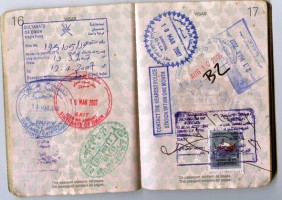
Getting There (Passports): If you are a U.S. citizen and have decided to tour in the UK, you must have a valid U.S. passport. All forms, for a new passport or a renewal, can be obtained online through the U.S. Department of State’s website: http://travel.state.gov. The cost varies between $55 and $165 depending on if you’re a first time applicant, renewing, or obtaining a passport book or card. Check out http://iafdb.travel.state.gov to view the passport facilities nearest you and apply at least two months in advance of your trip. If you need to obtain a passport sooner than that, you may opt for the expedited service (which takes two weeks, with an additional $60 fee). Passports are valid for ten years. After receiving your passport, be sure to sign it in ink; otherwise it will not be valid. Use a pencil to fill in the emergency contact information so that it can be readily updated.
Performing (Permits and Visas): In order for your group to perform in the UK, you need the requisite permits or visas. Essentially you have three options*: Work Permit, Entertainment Visa, or Business Visa.
Work Permit: If you are planning a traditional tour (i.e. performing for money) you’ll need a work permit, regardless of the duration of your stay or how many gigs you’ve lined up. Your work permit will be applied for by your employer – most likely your promoter or, in rarer circumstances, the club/booking agent. You’ll need a strict itinerary locked in prior to your employer applying for permits. If your band is less than 19 people, you’ll need a work permit for each member. Your UK-based employer can find applications for work permits for musicians specifically under the Sportspeople and Entertainers work permit category. There is a fairly short turnaround for the work permit application process, generally around two weeks.
Entertainment Visa: An entertainment visa is the way to go if your band is (a) heading to the UK to perform in a music competition; (b) taking part in a cultural event sponsored by the government, or (c) taking part in a charity concert. These are generally good for six months and afford you the luxury of staying abroad without the same restrictions you’ll encounter with a work permit. Of course, an entertainment visa is essentially predicated on the basis that you (i) are not paid for performing; and (ii) can include proof that you can support yourself during your time in the country.
Business Visa: In rare instances, a business visa may be the appropriate ticket to performing in the UK. If your band plans to perform at unpaid auditions and/or make personal appearances and promotions (radio interviews, talk shows, etc.) then a work permit is not required and you can get by on a business visa.
* Some bands have created a fourth option: traveling under the guise of tourists. This plan, which includes foregoing permits and visas, borrowing gear, bouncing from gig to gig and seeing what happens is neither airtight nor legal. If you take this route, be prepared for setbacks, tour cancellations and possible legal action. All in all, if you’re serious about your career and your tour, get serious about taking the correct steps to do it right.
Staying Out of Trouble: From accidents to arrests to theft, there is no shortage of ways to get into trouble overseas. To get started on the right foot, once you’re ready to head out, consider registering your trip with the U.S. embassy or consulate in your destination country. There is pretty much no downside to this: registration is free and ensures that you can gain assistance from the Department of State in the case of an emergency. To register, go to: http://travelregistration.state.gov/ibrs. As an added safeguard, visit the U.S. embassy or consulate upon arrival.
If you get into trouble along the way, the American Citizens Service (ACS) is the agency within each U.S. Embassy that will serve as your life preserver. ACS can assist you in many ways, including: passport replacements (you can have your passport replaced usually within 24 hours), financial assistance (transferring funds), medical information (local doctors, dentists, mental health specialists, etc.), informing your family if you are injured, and assisting you and your band in case of natural disaster or evacuation.
In case of theft, your best bet is to prepare backups of your most important information. Consider investing in an encrypted thumb drive prior to your departure and upload records of your work permits, visa, credit cards, passport information and social security card, credit card cancellation information, insurance contact information (health and travel) and anything else you might need in a bind.
Adam Barnosky is a practicing attorney and writer specializing in entertainment law and business development. He has worked with musicians, actors, and playwrights in Boston and New York City. Find him on Twitter @adambarnosky.
DISCLAIMER: The information contained in this column is general legal information only. Any use of this column does not create or constitute an attorney-client privilege. Consult your attorney for all specific considerations.